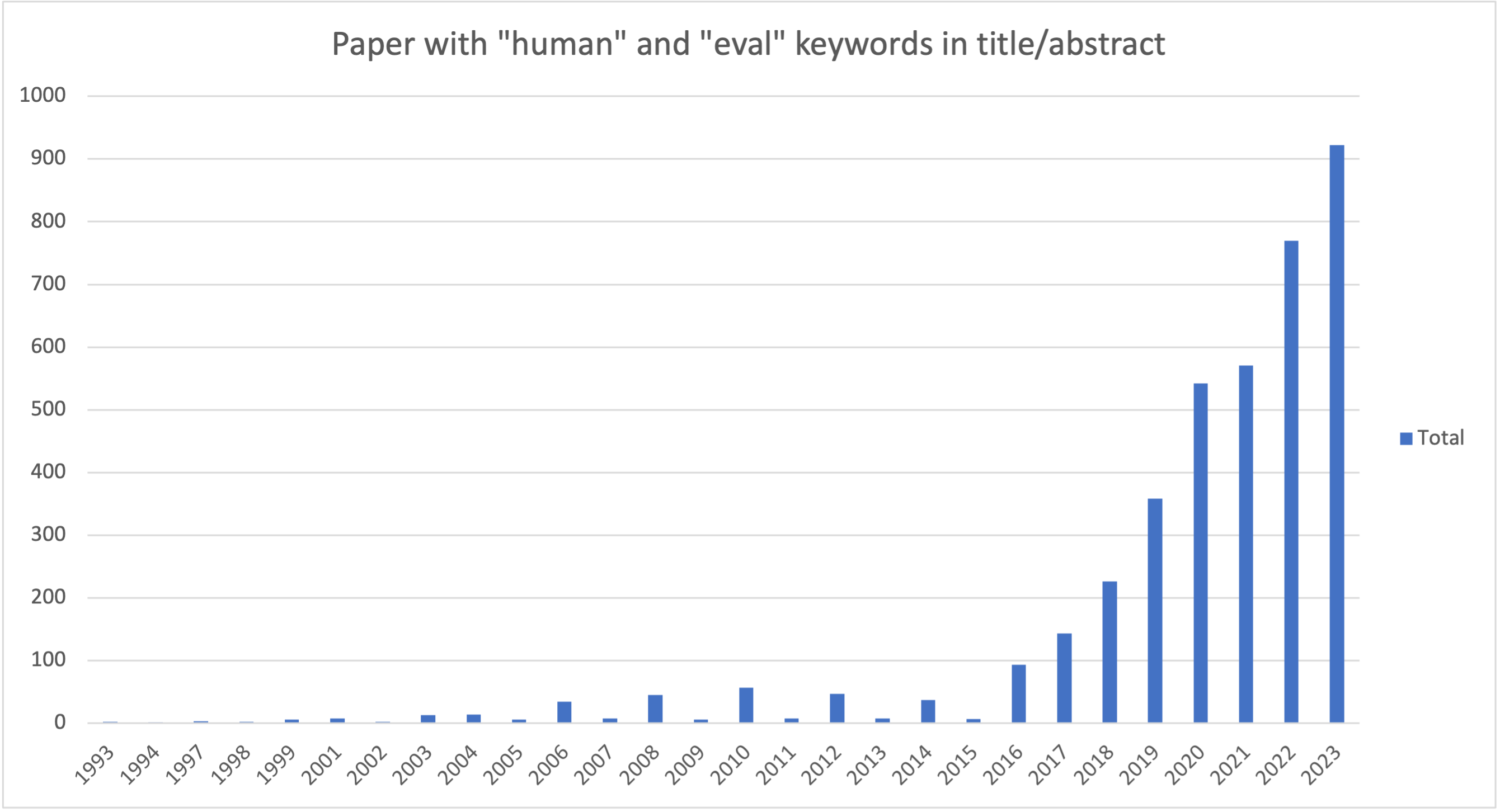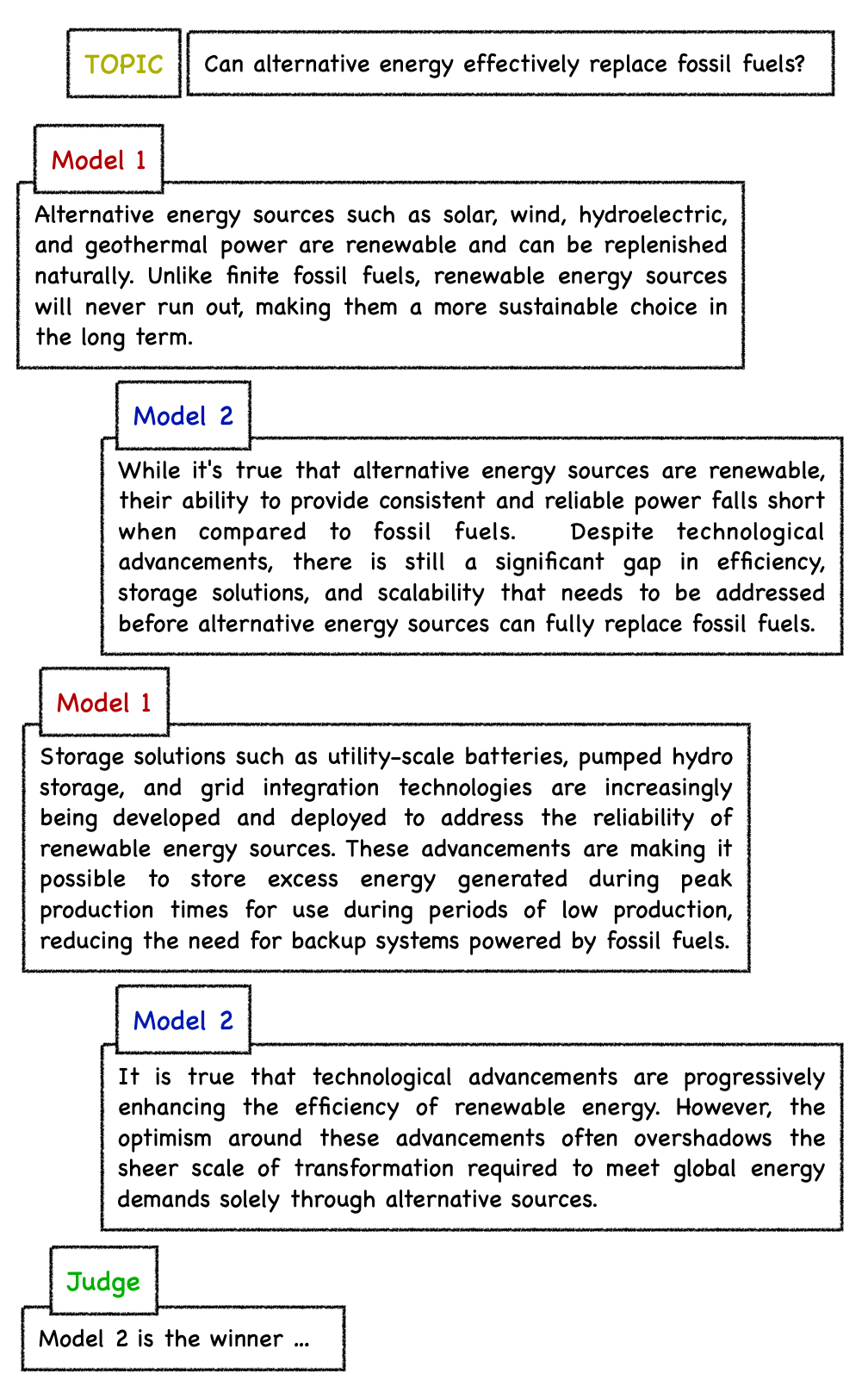ConSiDERS-The-Human Evaluation Framework: Rethinking Human Evaluation for Generative Large Language Models

0

Sign in to get full access
Overview
- This paper proposes a new framework called ConSiDERS for human evaluation of generative large language models (LLMs)
- The authors argue that current evaluation methods are insufficient and introduce a more comprehensive, contextual, and subjective approach to assessing LLM performance
- The framework incorporates multiple dimensions, including coherence, sensibility, diversity, empathy, and reflection, to capture the nuances of human-model interactions
Plain English Explanation
The paper discusses the challenges of evaluating large language models (LLMs) and proposes a new framework called ConSiDERS to address these challenges. LLMs are AI systems that can generate human-like text, but evaluating their performance is complex. The authors argue that current evaluation methods, such as METEOR and RealHumanEval, are insufficient because they don't capture the full spectrum of human-model interactions.
The ConSiDERS framework introduces a more comprehensive and subjective approach to evaluating LLMs. It considers multiple dimensions, including coherence, sensibility, diversity, empathy, and reflection, to provide a more nuanced understanding of the model's capabilities. This approach aims to better reflect the user's experience and the model's ability to engage in meaningful and contextual communication.
By using the ConSiDERS framework, the authors hope to address the issues identified in earlier research, where LLMs were found to be inconsistent and biased evaluators themselves. The ConSiDERS framework proposes a more human-centric evaluation that takes into account the subjective and contextual nature of language interactions.
Technical Explanation
The paper presents the ConSiDERS framework, which stands for Coherence, Sensibility, Diversity, Empathy, and Reflection. This framework aims to provide a more comprehensive and subjective approach to evaluating the performance of generative large language models (LLMs).
The authors argue that current evaluation methods, such as METEOR and RealHumanEval, are insufficient because they do not capture the nuances of human-model interactions. The ConSiDERS framework addresses this by incorporating multiple dimensions:
- Coherence: Assessing the logical flow and consistency of the model's responses.
- Sensibility: Evaluating the appropriateness and relevance of the model's responses in a given context.
- Diversity: Measuring the variety and originality of the model's responses.
- Empathy: Assessing the model's ability to understand and respond to the user's emotional state and perspective.
- Reflection: Evaluating the model's capacity to engage in self-reflection and provide meaningful insights.
The authors propose a human evaluation study to validate the ConSiDERS framework, where participants will assess the performance of LLMs across these dimensions. The results of this study are expected to provide a more comprehensive and nuanced understanding of LLM capabilities, addressing the issues identified in earlier research where LLMs were found to be inconsistent and biased evaluators themselves.
Critical Analysis
The ConSiDERS framework proposed in this paper represents a significant step forward in evaluating the performance of generative large language models (LLMs). The authors' recognition of the limitations in current evaluation methods, such as METEOR and RealHumanEval, is a valid concern that needs to be addressed.
The incorporation of multiple dimensions, including coherence, sensibility, diversity, empathy, and reflection, is a promising approach to capturing the nuances of human-model interactions. This aligns with the growing recognition that subjective and contextual factors play a crucial role in assessing the performance of these models.
However, the authors acknowledge that the proposed framework requires validation through human evaluation studies. The success of the ConSiDERS framework will ultimately depend on its ability to provide reliable and meaningful insights that can inform the development and deployment of LLMs. Additionally, the framework may need to be refined and expanded as the field of LLM research continues to evolve.
Another potential limitation is the inherent subjectivity in the evaluation process. While the authors aim to capture the user's experience, the assessment of qualities like empathy and reflection may be influenced by individual biases and interpretations. Addressing this subjectivity and ensuring consistent and reliable evaluations will be a key challenge in implementing the ConSiDERS framework.
Conclusion
The paper presents a novel framework called ConSiDERS for the human evaluation of generative large language models (LLMs). By incorporating multiple dimensions, including coherence, sensibility, diversity, empathy, and reflection, the authors aim to provide a more comprehensive and subjective approach to assessing the performance of these models.
The proposed framework represents a significant step forward in addressing the limitations of current evaluation methods, which have been criticized for failing to capture the nuances of human-model interactions. If successfully implemented and validated, the ConSiDERS framework could lead to a better understanding of LLM capabilities and guide their development and deployment in a more human-centric manner.
While the framework requires further validation and refinement, the authors' recognition of the need for a more holistic and contextual approach to LLM evaluation is a valuable contribution to the field. As the capabilities of LLMs continue to evolve, the ConSiDERS framework may serve as a foundation for developing more robust and meaningful assessment tools that can better reflect the user experience and the societal impact of these powerful AI systems.
This summary was produced with help from an AI and may contain inaccuracies - check out the links to read the original source documents!
Related Papers


0
ConSiDERS-The-Human Evaluation Framework: Rethinking Human Evaluation for Generative Large Language Models
Aparna Elangovan, Ling Liu, Lei Xu, Sravan Bodapati, Dan Roth
In this position paper, we argue that human evaluation of generative large language models (LLMs) should be a multidisciplinary undertaking that draws upon insights from disciplines such as user experience research and human behavioral psychology to ensure that the experimental design and results are reliable. The conclusions from these evaluations, thus, must consider factors such as usability, aesthetics, and cognitive biases. We highlight how cognitive biases can conflate fluent information and truthfulness, and how cognitive uncertainty affects the reliability of rating scores such as Likert. Furthermore, the evaluation should differentiate the capabilities and weaknesses of increasingly powerful large language models -- which requires effective test sets. The scalability of human evaluation is also crucial to wider adoption. Hence, to design an effective human evaluation system in the age of generative NLP, we propose the ConSiDERS-The-Human evaluation framework consisting of 6 pillars -- Consistency, Scoring Criteria, Differentiating, User Experience, Responsible, and Scalability.
Read more9/4/2024
💬

0
A Literature Review and Framework for Human Evaluation of Generative Large Language Models in Healthcare
Thomas Yu Chow Tam, Sonish Sivarajkumar, Sumit Kapoor, Alisa V Stolyar, Katelyn Polanska, Karleigh R McCarthy, Hunter Osterhoudt, Xizhi Wu, Shyam Visweswaran, Sunyang Fu, Piyush Mathur, Giovanni E. Cacciamani, Cong Sun, Yifan Peng, Yanshan Wang
With generative artificial intelligence (AI), particularly large language models (LLMs), continuing to make inroads in healthcare, it is critical to supplement traditional automated evaluations with human evaluations. Understanding and evaluating the output of LLMs is essential to assuring safety, reliability, and effectiveness. However, human evaluation's cumbersome, time-consuming, and non-standardized nature presents significant obstacles to comprehensive evaluation and widespread adoption of LLMs in practice. This study reviews existing literature on human evaluation methodologies for LLMs in healthcare. We highlight a notable need for a standardized and consistent human evaluation approach. Our extensive literature search, adhering to the Preferred Reporting Items for Systematic Reviews and Meta-Analyses (PRISMA) guidelines, includes publications from January 2018 to February 2024. The review examines the human evaluation of LLMs across various medical specialties, addressing factors such as evaluation dimensions, sample types and sizes, selection, and recruitment of evaluators, frameworks and metrics, evaluation process, and statistical analysis type. Drawing on the diverse evaluation strategies employed in these studies, we propose a comprehensive and practical framework for human evaluation of LLMs: QUEST: Quality of Information, Understanding and Reasoning, Expression Style and Persona, Safety and Harm, and Trust and Confidence. This framework aims to improve the reliability, generalizability, and applicability of human evaluation of LLMs in different healthcare applications by defining clear evaluation dimensions and offering detailed guidelines.
Read more9/25/2024


0
Human-Centered Design Recommendations for LLM-as-a-Judge
Qian Pan, Zahra Ashktorab, Michael Desmond, Martin Santillan Cooper, James Johnson, Rahul Nair, Elizabeth Daly, Werner Geyer
Traditional reference-based metrics, such as BLEU and ROUGE, are less effective for assessing outputs from Large Language Models (LLMs) that produce highly creative or superior-quality text, or in situations where reference outputs are unavailable. While human evaluation remains an option, it is costly and difficult to scale. Recent work using LLMs as evaluators (LLM-as-a-judge) is promising, but trust and reliability remain a significant concern. Integrating human input is crucial to ensure criteria used to evaluate are aligned with the human's intent, and evaluations are robust and consistent. This paper presents a user study of a design exploration called EvaluLLM, that enables users to leverage LLMs as customizable judges, promoting human involvement to balance trust and cost-saving potential with caution. Through interviews with eight domain experts, we identified the need for assistance in developing effective evaluation criteria aligning the LLM-as-a-judge with practitioners' preferences and expectations. We offer findings and design recommendations to optimize human-assisted LLM-as-judge systems.
Read more7/8/2024


0
Evaluating the Performance of Large Language Models via Debates
Behrad Moniri, Hamed Hassani, Edgar Dobriban
Large Language Models (LLMs) are rapidly evolving and impacting various fields, necessitating the development of effective methods to evaluate and compare their performance. Most current approaches for performance evaluation are either based on fixed, domain-specific questions that lack the flexibility required in many real-world applications where tasks are not always from a single domain, or rely on human input, making them unscalable. We propose an automated benchmarking framework based on debates between LLMs, judged by another LLM. This method assesses not only domain knowledge, but also skills such as problem definition and inconsistency recognition. We evaluate the performance of various state-of-the-art LLMs using the debate framework and achieve rankings that align closely with popular rankings based on human input, eliminating the need for costly human crowdsourcing.
Read more6/18/2024